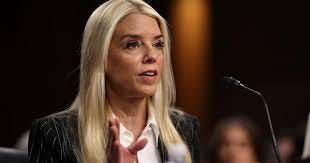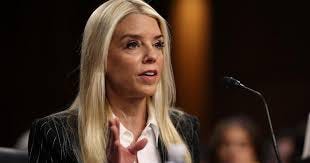Qualified vs Quality
Last week, Pam Bondi had her confirmation hearing before the Senate Judiciary Committee. She is undoubtedly qualified. Does this mean she will be a quality Attorney General? As always, it depends!
Justice Briefs is a weekly newsletter devoted to federal criminal prosecution. The federal government’s evolution over the last 230 years has given federal prosecutors significant discretion. Few realize it exists and even fewer know how it is used. Justice Briefs aims to make federal prosecutions and prosecutors more accessible to the general public. Please help me in this endeavor by subscribing and sharing with others.
Justice in Brief
In the Western District of Tennessee, a leader of the Hoover Criminal Gang was sentenced for ordering fellow gang members to murder a rival gang member.
In the Southern District of Florida, a man from Nigeria who sent letters to people in the United States falsely claiming the man was a Spanish banker who had inheritance money for the victim entered a guilty plea.
In the District of Minnesota, a man was charged with hate crime offenses for attacking a black man outside a bar.
What makes a quality Attorney General?
Today Donald Trump will be sworn in as the nation’s 47th president. In anticipation of that, the Senate has already conducted confirmation hearings for many of Donald Trump’s top Cabinet appointments. Among them was Pam Bondi’s nomination for United States Attorney General. Though not as controversial as Donald Trump’s original nominee, Matt Gaetz, some have raised questions about her fitness to be Attorney General. Bondi is undoubtedly qualified, in the technical meaning of the term. But will she be a quality Attorney General? The answer to this depends upon what a quality Attorney General looks like. Last week, we saw that a deliberative decision-making process is helpful in some circumstances but will upset partisans. This week’s issue looks at the questions Bondi was asked and what they reveal about our expectations for the Attorney General.
Overall, Bondi presented a strong, passionate, and partisan appearance. Her opening statement revealed how she defined herself. She is a state prosecutor. After graduating law school, she began working in the Hillsborough County (FL) State’s Attorney’s Office. She rose through the ranks prosecuting all types of state criminal offenses. In her opening statement she spoke passionately about prosecuting violent and narcotic offenses and working with the victims of both. In 2011, she became Florida’s 37th Attorney General and first female to hold the position. This post gave her a more comprehensive look at the opioid crisis. It became the centerpiece of her administration. When term limits forced her out of office, she joined Donald Trump’s impeachment defense team. This launched her work in private practice, performing legal work of a lobbying firm. She would later join the America First Policy Institute. During her hearing, she refused to concede that Joe Biden won the 2020 election, saying only that he was president. She also defended Donald Trump’s FBI Director nominee Kash Patel, who claims he has an enemies list that he will pursue. At the same time, she firmly stated the Justice Department will not have an enemies list and will only prosecute criminal offenses and not target people.
The questions from both Republican and Democratic Senators focused on two major issues. First, they asked about prosecutorial independence. This was emphasized mostly by Democrats but Republicans noted it also. Second, they asked about weaponizing the Justice Department to attack political enemies. Bondi’s responses, in some instances, were strong and forceful, repudiating any intent to allow political preference to influence decisions. At other times, she dodged questions about potential conflicts that might arise. To the Senate Judiciary Committee’s credit, these are the two key political issues involving the Justice Department today.
Prosecutorial independence refers to the professional freedom prosecutors have to exercise independent legal judgment. In this context, the concern is that the White House, regardless of which party occupies it, will not interfere in the Department’s prosecutorial decisions. Senator Dick Durbin of Illinois, the highest ranking Democrat on the Committee, wasted little time drawing attention to Bondi’s willingness to implement Donald Trump’s commands by interrogating her on her beliefs about the 2020 election. Bondi’s response demonstrated the balance she sought throughout the hearing. She recognized Joe Biden as President but would not concede he won the election. She accepted the results but claimed she “saw many things” in Pennsylvania. Next Durbin asked about Donald Trump’s phone call to Georgia’s Secretary of State asking the Secretary to find Trump another 11,000 votes. Bondi, somewhat surprisingly, said that she had not heard the call in its full context so she could not comment on what Trump meant but was confident that Trump was not asking the Secretary to commit election fraud.
When Minnesota’s Senator Amy Klobuchar asked more directly that Durbin, Bondi gave a more direct answer. Senator Klobuchar asked whether Bondi would act independently from the White House. As Bondi said repeatedly, to Senators on both sides, she would ensure that the Justice Department made decisions fairly and even-handedly. To Klobuchar’s question, Bondi emphasized that politics will not play a part in Justice Department decisions. Bondi also pledged to follow the same “contacts policy” that Attorneys General have followed for decades. This policy prohibits White House contact with the Justice Department other than through the Attorney General or the Deputy Attorney General.
Questions also focused on the use of the Justice Department as a weapon against political opponents. More than once, as candidate, Donald Trump promised to retaliate against federal prosecutors, investigators, and members of Congress who investigated his post-2020 election conduct. Rhode Island Senator Sheldon Whitehouse raised the issue by referring to Donald Trump’s choice to lead the FBI, Kash Patel. During the campaign, Patel made it known that he had compiled an “enemies list” comprised of people who should be prosecuted when Donald Trump re-gained the presidency. Bondi denied hearing anything about it but assured the Committee that the Justice Department would not maintain any enemies list. Later, she would pledge not to target people based on political affiliation. Instead, the Justice Department would begin with a crime and then find the offender. Then she asserted that the Garland Justice Department did not do this with Donald Trump’s charges. He had been targeted because he was Joe Biden’s political opponent.
Senator John Kennedy from Louisiana posed the most interesting line of questions relating to weaponization. He began by highlighting a couple high-profile criminal convictions as examples of what a strong Justice Department could do. Then he turned to the Trump prosecutions. He claimed that Merrick Garland had “broken the seal” and “normalized” the practice of prosecuting former presidents. He then went in a different direction. Kennedy sought a promise from Bondi that she would avoid the temptation to prosecute Democrats. He only wanted her to prosecute on the basis of facts, evidence and fairness. Bondi agreed.
As Senators from both sides said, Pam Bondi is qualified to be Attorney General. The law does not provide any specific qualities a person must have to be Attorney General. The original statute creating the position only required that the Attorney General be “a meet person, learned in the law.” Using these original requirements, Bondi is qualified. But will she be a quality Attorney General. She will be dedicated and passionate. She will pursue violent crime and drug abuse. She persuasively asserted that she would only pursue cases where the evidence indicated a violation of law. She also emphatically stated she would act independently of the White House. While she did all of this, she also strongly supported President Trump and would not acknowledge some of his questionable behavior. What will she do when confronted with Donald Trump’s loyalty tests. Both Jeff Sessions and Bill Barr failed as they placed their professional standards above Donald Trump’s personal interests. Whether Pam Bondi does this will define whether she is not only qualified but a quality Attorney General.
I hope you enjoyed this issue and that it made you stop and think. I would love to hear any comments, questions, concerns, or criticisms that you have. Leave a comment or send a message! Also, if you enjoyed this or if it challenged your thinking, please subscribe and share with others!



